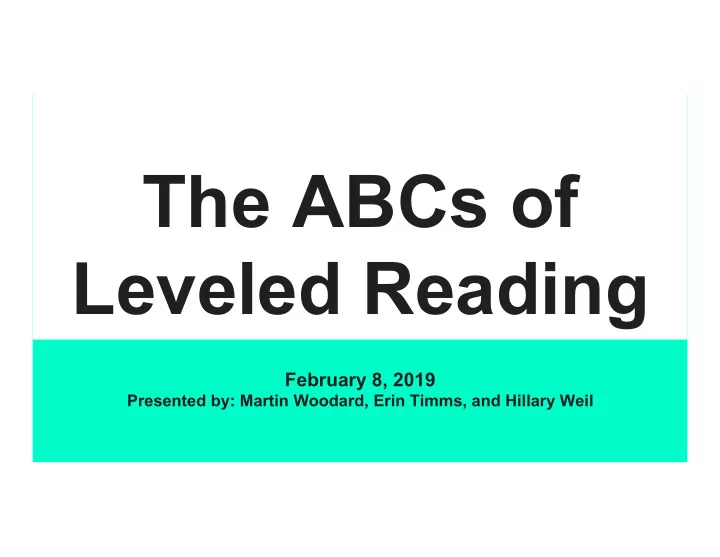

The ABCs of Leveled Reading February 8, 2019 Presented by: Martin Woodard, Erin Timms, and Hillary Weil
Before Leveled Reading: Concepts of print Most children develop concepts of print through experiences with books, without a lot of direct instruction. Your child needs to develop concepts of print before they can start sounding out words. Essential concepts of print: ● Children hold books correctly and turn pages in the right direction. ● Children understand that text is read from left to right. ● Children know that each word on a page represents a spoken word. How to help develop concepts of print: ● Read to your child often. ● Introduce books by their title. Sometimes, draw attention to the author and illustrator. ● Make sure some of the books you read have large bold print, and point to the words as you read. ● Point out signs in your environment (the Cheerios box, an EXIT sign, and the sign at your grocery store). Help your child see that print is all around you.
Why we use reading levels ● Match readers to “just right” texts → Differentiation ● Help identify skills to teach next ● Allows for student choice ● Developmentally appropriate content
How we assess to determine a child’s reading level ● Concepts of print ● Letter/sound ID ● Sight words ● Running Records
Independent Levels Need... ● 96%+ accuracy ○ Miscues and self-corrections ○ We code for type of error (meaning, syntax, visual) ● Fluency and Expression ● Retell ○ Concise, accurate, essential story elements ● Literal Comprehension ○ Ex: “What animals did the girl see on her hike?” ● Inferential Comprehension ○ Ex: “How did the girl feel at the end when she saw the bear?”
Text Bands We group texts in “bands.” Texts in the same band require similar skills. While a student will have a single “just right” level, they will likely be able to access texts in their band with relative independence. Moving to a new band requires the acquisition of an additional skill set. Band jumps tend to require additional instruction and support. Skills are cumulative! Typical K Range AB CD EF GHI JKLM Typical 1st Grade Range
Essential Skills for LEvels AB ● One to one correspondence: Match one spoken word to one printed word ● Repeat a pattern ● Learn a few high frequency words ● Use the picture and what is happening in the text to help solve words (at these levels, students do not yet need to attend to letter sounds) *At these levels, students typically get a book introduction from an adult. We want to move students out of these levels as soon as they have solid one to one correspondence.
Essential Skills for LEvels CD ● Read multiple lines of text with return sweep ● Use letter sound knowledge (initial sound) along with picture cues to decode ● Continue to build sight word vocabulary ● Attend to what is happening in the pictures to notice pattern changes *At these levels, we want students to begin to look closely at words.
Essential Skills for LEvels EF ● Use beginning part of word and first vowel sound ● Begin to recognize word features, such as blends, digraphs, and “magic e” ● Recall the most important events ● Deal with longer stretches of dialogue and split dialogue ● Recognize diverse dialogue markers (ex: shouted, giggled, whispered)
Essential Skills for LEvels GHI ● Use meaningful parts of words to decode ● Flexibility with letter sounds, especially vowels ● Self-correct at the point of error ● Match retell structure to text ● Use pictures to begin to identify character feelings and traits ● Read fluently and with expression *At the end of this band, we think about a “fluency threshold.” Students must be able to read fluently to be able to maintain comprehension as they move into the next text band. If a student is not yet fluent, they will need to stay in this band until that skill develops.
Essential Skills for Levels JKLM: Early Chapter Books ● Strong understanding of story elements (character, setting, action) and structure ● Sophisticated vocabulary and ability to tackle unfamiliar words ● Synthesize text and determine importance ● Infer character feelings, traits, and motivations from text ● Talk about books and independently explore interests *Once students reach this band, movement between levels slows significantly, as students will need to spend more time at each level. Moving across this band typically takes about a year.
Why Reading to Your Child is Essential ● Develop love of reading, parent/child bonding ● Most picture books are level N and above ○ Reading aloud provides exposure to more sophisticated texts, themes, and story language than your child would be able to access independently ● Vocabulary acquisition ○ 80% of the vocabulary a person knows is learned before age 6, primarily through being read to! This impacts a child’s lifelong position toward learning and academic success. ● Model desired reading behaviors ○ Stop & talk, ask questions, expression
Independent Reading At Home ● Time spent on Independent Reading ○ Kindergarten: At least 10 minutes per day ○ 1st grade: At least 20 minutes per day ○ Balance of fiction and non-fiction ● How to help/how much to help ○ Keep it positive, don’t overcorrect ○ Kindergarten Prompts ○ 1st Grade Prompts ○ Games and activities to help support reading skills ■ Sight words ■ Guess the covered word
Questions ?
Recommend
More recommend